Behavioral experts believe that people are more interested in hearing a story about an investment than in assessing its risk.
Behavior Macro reports: It doesn’t matter how much you explain to clients the centrality of risk management; they obligingly nod, wait for their turn to speak, and say, “Oh, that’s great. Now, what do you think about the euro here?”
Clients, like traders, crave stories. They want to believe the people they trust with their money are genetically superior, multilingual polymaths. We managers want to believe this about ourselves, too.
But the truth is that in addition to loving stories, we are all hard-wired to be poor risk managers.
Behavioral studies show that we are risk adverse when it comes to losing money, but we take on much more risk when we are trying to “get back to even.” This is referred to as the reflection effect.
Translated in trading, this means we tend to harvest profits too early, and tend to let our losers run. This is where the famous “I’ll sell it when it gets back to where I bought it” comes from. The reflection effect generates negative payoff asymmetries.
One of the most important risk management tools is doing the opposite: Generating positive payoff asymmetries in your trading. Risking one to make three. Risking two to make five. This is what good traders do, even if they claim their P&L comes from superior intellect. And, of course, if a trade breaks your way, you can use trailing stops and/or other techniques to improve your payoff asymmetries even further.
So, what one really needs to do is set up trades so that winners run and losers are dumped quickly.
Think about the math. If you are risking one to make a minimum of three, and your ideas are right 50% of the time, you will be doing very well. In fact, your batting average could be far less than 50% and you’d still make money. If you regularly take profits quickly, as “everyone’s” would have us do, your batting average needs to be far higher.
Anything that appeals to our instincts to take profits quickly is likely to make us worse traders, not better. And trading is hard enough as it is.
This may seem obvious, but if it were that obvious, no one would ever again say, “You can never go broke taking a profit.” Ever.

